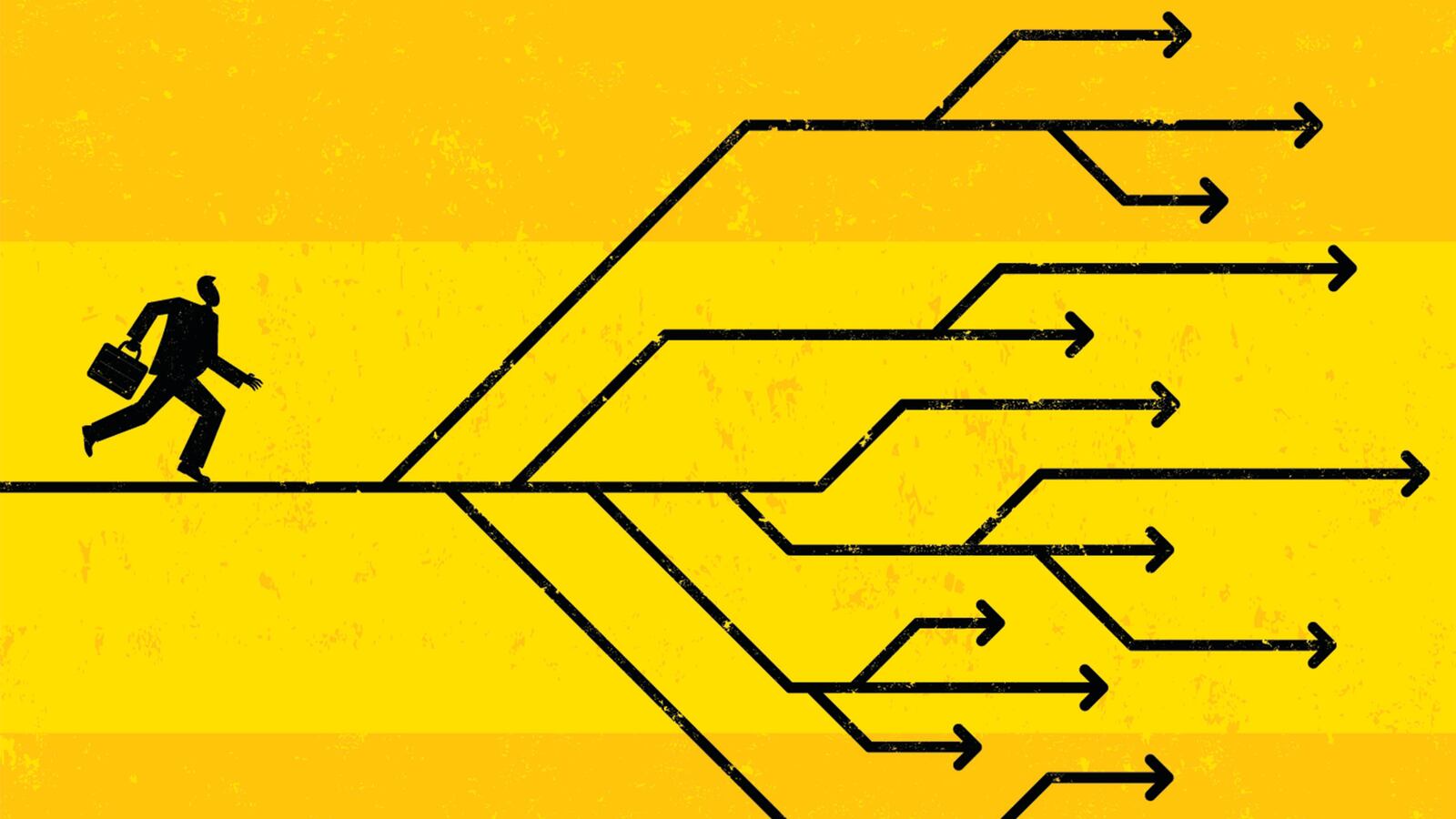Finally, an answer to that age-old kindergarten/cocktail question: Which animal most closely resembles you, and why?
I am Buridan’s ass. Because I can never make up my damn mind.
The answer comes courtesy of Gretchen Rubin’s Better Than Before: Mastering the Habits of Our Everyday Lives. Anyone who’s been wracked with a hard decision can relate to Buridan’s ass, a donkey plunked between two identical bales of hay who couldn’t decide which to move towards and eat, so he stood there and died. Much like this poor dead donkey, I will endlessly debate all options, until, eventually, choosing nothing. This explains how I’ve tolerated scratched glasses lenses and bare apartment floors: choosing new frames or a new rug gives me analysis paralysis.

But trying to change this way of thinking, much like telling yourself tomorrow you’ll magically turn into a morning person, and by the end of the year you’ll lose five or 50 pounds, is wishful thinking—unless, of course, you change your habits, and to do that, according to Rubin, you must know exactly what kind of person you are. Thankfully, in her new treatise on remaking your habits, the aggressively optimistic author of the bestsellers The Happiness Project and Happier at Home conjures up a language to define all your quirky flaws.
Pimping your habit mojo begins by determining how you respond to expectations. According to Rubin’s reasoning, different personality types react differently to what other people ask of them. If you’ve ever envied a friend’s aptitude to keep her 10 p.m. bedtime or drop sugar for two weeks “because I’m going to Tulum, y’all!” then reading Better Than Before is like seeing the sun after a bitter New York winter: You’re totally flummoxed, but suddenly life makes sense again.
Rubin breaks down personality types as follows: Upholders are gold star-seeking perfectionists who have no trouble holding themselves to internal goals (like writing a web series) and external ones (attending work meetings). These people are unicorns; Rubin is one, which probably explains why she’s written three books in the time it takes most writers to find a pen.
Obligers crave external accountability to get things done, but often fail if left to their own devices.
Questioners debate every goal and only fulfill external expectations they find valuable.
And naughty Rebels chafe against structure or people giving them orders—a congested Google Calendar is their hell. (Rubin created a quiz to help you determine your type here.)
Figuring out your “type” can be eye-opening—or a convenient way to make excuses for all your failures. (As in: “I always get to morning meetings late not because I’m lazy, but because obviously I’m a Questioner, and I don’t find what happens there valuable,” which is a thing I just told myself.) Questioners are apparently motivated by reason, logic, and fairness. They’re always asking “why?” and will do exhaustive research. Anyone who’s spent hours trolling Amazon reviews or endlessly scrolling Seamless dinner options is probably a Questioner.
Better Than Before veers away from other recent books on habit formation, like Charles Duhigg’s excellent science-sourced The Power of Habit, and much of Rubin’s habit know-how is conjured up from human observation. Apparently her friends, family, and acquaintances live in one giant Petri dish of bad habits, providing her the perfect environment to swoop in, sanitize their lives and apartments, buy them standing desks, and uphold her ultimate goal: to help others establish habits that make them better than before. She also embarks on her own quest for change, buying a digital scale, a Jawbone UP, and more paraphernalia that people embrace because, If I spent all this money, I’ll change my whole life, right?!
It’s terribly entertaining. But Rubin is indeed tapping into something very real, as we swim in a culture teeming with productivity hacks, quantifying apps, and historical dissections. Drink 50 cups of coffee like Balzac and you’ll write 15 hours a day! Sleep like Arianna and you’ll become a Greek gazillionaire! Wear Zuckerberg’s hoodie—to eliminate choice fatigue—and you’ll invent the next Facebook! Organize your closet like Marie Kondo and make your life more joyful!
But she argues that these individual solutions do not fit every problem. We’re fickle creatures, as discriminating in our habit adoption as we are in choosing our next Netflix binge. All of the downloads in the App Store won’t solve your dilemmas unless your goals have clearly defined values. You will not wake up tomorrow and do a hundred squats unless carting around a Kim Kardashian derriere is actually something that feels valuable to you (and even then, sorry, but you’ll have to undergo treatments much more vicious than squats). Likewise, you won’t turn down a stress-diluting glass of Grüner Veltliner unless teetotaling is tied to an outcome with a longer tail: losing weight, fewer bad choices, less savage hangovers.
To dig yourself out of a mind rut you’ll have to employ one of Rubin’s many strategies for habit formation. Say you want to join a gym but also need to save money, so delay buying a membership. Rubin calls this a false choice: You’re directly tying two goals to each other so you won’t have to decide. Instead you should dig into the Strategy of Clarity and evaluate which outcome you actually value more, losing weight or saving money, and determine a way to do both.
There’s the Strategy of Monitoring, which explains why Fitbits or calorie counters are so powerful. Tracking exactly what you’re doing leaves no room for you to hide. Upholders and Questioners might adopt this more easily. Finding like-minded souls—the Strategy of Other People—works especially well for Obligers. This is why joining a weekly running group or telling people about your goals is a good trick.
She also coins other nicknames: Are you a Finisher (who doesn’t want to start new projects until your previous one is buttoned up) or an Opener (who gets off on starting 18 new goals)? When it comes to work, are you a Marathoner (who enjoys long, steady progress towards a goal), Sprinter (who gets motivated up against a deadline) or a Procrastinator (you know who you are). While typifying everyone is a simple idea, these names actually shed light on often crippling problems. Rubin also explains why after two weeks of healthy eating you’ll fall straight off the organic bandwagon and into a vat of Nutella. There’s danger in rewarding yourself for reaching a goal, and not learning to build a new habit. (She doesn’t approve of finish lines, which often cause a last-minute sprint towards a habit and then completely implode it.)
But along with the rise of habit analysis and quantifying everything from your steps to your biome, comes its evil twin: the ability to fall miserably short in a million new ways. One of the best parts of Better Than Before comes when Rubin tries to start a meditation habit. She eventually gives up, saying she didn’t like it. Thank God. Despite her habit mania, she admits that just because everyone from Oprah to Silicon Valley CEOs enjoys doing daily incantations doesn’t mean she also needs to close her eyes and chill.
At one point, Rubin goes on an anti-carb tear, dropping breads and desserts completely from her diet, which was one clue that Upholders may actually be part cyborgs. The author does wonder if her preoccupation with eating better, sleeping more, or clearing out her to-do list is petty. She asks her sister Elizabeth (with whom she co-hosts an entertaining podcast, “Do you think I’m a killjoy? Am I turning into a humorless habits machine?”
Hmmm. Witnessing Rubin’s obsession was like looking into a mirror (except, for the record, I’m taking carbs with me to the grave). For all my Questioner predilections, I do love telling other people what habits to adopt. I’m Buridan’s ass with an agenda, quick to inform friends or strangers about apps and programs to track their sleep, analyze their time management, schedule their emails, and make their lives run on autopilot. Because that sounds like fun, right? Bueller?
Luckily, she comes to her senses—she is writing a book about habits after all—and concludes, “In the end, mastering those habits would allow me to put these questions out of my mind, to transcend them. I could turn my attention to worthier matters, and yet be assured of the solidity of the architecture of my everyday life.”
This sounds like a lovely idea, one that I was sure I’d carry with me. I put Better Than Before on my shelf and started thinking about which book to read next. A Questioner until the end, I couldn’t decide—and took a nap instead. Seems I’ll forever be Buridan’s ass, but at least now I know why.






